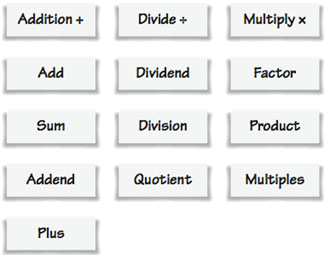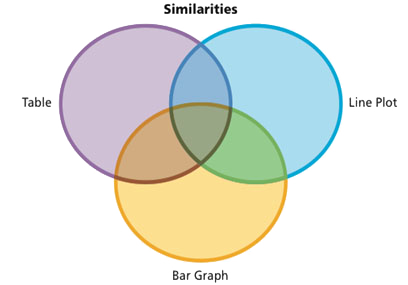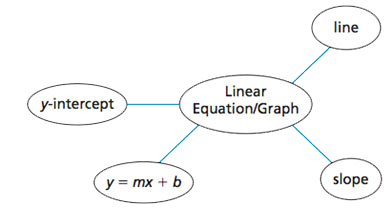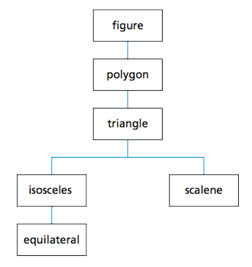Visuals
In the first year of implementation, English-proficient students can earn extra credit by finding appropriate visual aids for targeted lessons. Teachers can then keep the pictures, objects (if possible), and book names (with page number) on file for use in subsequent years.
Word Clusters
Write mathematical terms on sentence strips and group them together to show how they are connected. Hang the sentence strips from the ceiling or on a wall for quick reference.

Rebuses
Create rebus pictures or symbols for words the students need help to understand.
![]()
- Students can draw the symbols directly over the words.
- A sheet of these symbols can be kept in the vocabulary section of students' binders.
Vocabulary Charts
The use of word cognates (linguistically related words) help students connect words in English to words from their own language that are familiar. Not all words have cognates. However, all terms are put on this chart even if they don’t have cognates.
| Term | Description | Example | Cognate |
|---|---|---|---|
| Factor | One of two or more whole numbers that are multiplied to get a product | 2x3 = 6 | Factor |
| Prime Number | Numbers with only 2 factors, 1 and itself | 3 : 1x3 7:1x7 |
Numero Primo |
Venn Diagrams
Use Venn diagrams as a way to compare and contrast information. The example below is from Data About Us.

Concept Maps
Concept maps are used to organize topics or categories and to visually represent connections between concepts and ideas.

Tree Diagrams/Hierarchy
Use tree diagrams to organize ideas from the general to the specific and to support understanding of the relationships between concepts.

Charts, Lists and Timelines
Other visuals that organize information include charts, lists, and timelines.
Daily Agenda - 6th Grade
| Monday | Tuesday | Wednesday | Thursday | Friday |
|---|---|---|---|---|
| Objectives: Activities: Homework: |
Objectives: Activities: Homework: |
Objectives: Activities: Homework: |
Objectives: Activities: Homework: |
Objectives: Activities: Homework: |
Five Guidelines for Simplifying Language
| Guideline | Original | Simplified | ||||||||||||
|---|---|---|---|---|---|---|---|---|---|---|---|---|---|---|
| 1. Use short sentences and eliminate extraneous material. | Samuel is getting a snack for himself and his little brother, Adam. There are two candy bars in the refrigerator. Samuel takes half of one candy bar for himself and half of the other candy bar for Adam. Adam complains that Samuel got more. Samuel says this isn't true, since he got half and Adam got half. What might be the problem? | Same and Adam have two candy bars. Sam eats half of one candy bar. Adam is mad. He thinks Sam has more candy. What is the problem? | ||||||||||||
| 2. Change pronouns to nouns. | Jorge made two graphs but he forgot to label them. | Jorge made two graphs. Jorge forgot to label the graphs. | ||||||||||||
| 3. Underline key points or vacabulary. | Problem 1.1 A. How are the graphs alike? How are the graphs different? B. How can you use the graph to find the total number of letters in all the names? C. Collect the data for your class and use graphs to represent the data distribution. |
Problem 1.1 A. How are the graphs alike? B. How can you use the graph to find the total number of letters in all the names? C. Collect the data for your class and use graphs to represent the data distrubtion. |
||||||||||||
| 4. Turn narratives into lists. | Look back at the graphs that you have made in this Unit. Find several graphs that show relationships in which y both, increases and decreases as x increases. Describe each graph in words. | Look at the graphs you made. A. Find a graph where y increases and x increases. B. Find a graph where y descreases and x increases. C. Use words to describe each graph. |
||||||||||||
| 5. Use charts and diagrams. | Maria has $25.00 in the bank. She mows the lawn each week and earns $5.00 each time. Suzanna only has $15.00 in the bank. She baby-sits her little brother for $2.00 each weekday. Maria spends $3.00 each week to go to the basketball game with her friends. Suzanna spends $4.00 each week to go to the movies. |
|